OTTAWA – When the Conservatives accepted a proposal in May for a debate on foreign policy, they said they looked forward to the discussion because the issues had been afterthoughts in previous election debates.

But Stephen Harper heads into Monday night’s Munk Debate in Toronto after weeks of facing foreign policy issues on the campaign, from the government’s arms deal with Saudi Arabia to the response to the Syrian refugee crisis and the looming end to negotiations on the Trans Pacific Partnership trade deal.
READ MORE: Federal government eases rules on Syrian refugee claims
Even the niqab, a domestic policy argument on whether they should be worn during citizenship ceremonies, takes on geopolitical overtones in the context of the Conservative government’s relationship with the Muslim world.
WATCH: Unpacking the politics: the political power of the niqab
It all changes the tone of the debates for the prime minister, who’d initially accepted the invitation for a simple reason – it provided an easy opportunity to attack his rivals.
“There are stark differences between Prime Minister Stephen Harper and the Opposition leaders on foreign policy including how to respond to Russian aggression in Eastern Europe, how best to combat the rise of ISIS, and the importance of expanding free trade around the world,” his spokesman Kory Teneycke has said.
While there’s no doubt Harper will come out swinging by suggesting his opponents are soft on terrorism and global security, he also must demonstrate another side, said a Conservative strategist who asked for anonymity.
READ MORE: Mulcair confident military could bring 10,000 Syrian refugees to Canada by end of 2015
- ‘Shock and disbelief’ after Manitoba school trustee’s Indigenous comments
- Canadian man dies during Texas Ironman event. His widow wants answers as to why
- Several baby products have been recalled by Health Canada. Here’s the list
- ‘Sciatica was gone’: hospital performs robot-assisted spinal surgery in Canadian first
“On the political side, he needs to play to female voters who think empathy towards people is part of foreign policy,” said the strategist, who has advised the government and the party in the past on foreign policy but isn’t authorized to speak publicly on the subject.
Conservative candidates were reporting getting an earful about his initial response to the photograph of a dead Syrian toddler whose extended family had been trying to come to Canada. That furor has subsided with the announcements of a matching contributions fund and new rules for refugee applications, but it’s still a tricky subject to navigate. Advisers have been telling him to choose his words carefully.
READ MORE: Harper says Canada will do more to help Syrian refugees in near future
Harper needs to reference the softer side of his foreign policy record – leadership on the maternal and newborn child health program as one, and Canada’s stand as one of the leading donors to the refugee crisis as another, the strategist said.
On Sunday, the Conservatives announced another softer policy in the foreign sphere – more support for victims of human trafficking, and more resources for police to crack down on traffickers themselves.
It was a classic Conservative two-fer on an international issue: pledge more aid but also highlight security, the same approach they took to announcing new measures for refugee resettlement, and the idea of foreign policy as integrated approach is a theme Harper is expected to hit on during the debate.
Foreign policy isn’t generally a direct ballot box question, strategists say. Voters won’t cast a ballot based on the number of trainers Canada is sending to Ukraine or which jet a government chooses to buy.
It’s more of an emotive issue and one Conservatives say they believe plays out for them as a question of leadership. In the 2011 campaign, the party ran ads directly referencing their approach to Canada’s place in the world, in this campaign they’ve focused on more basic questions, summed up in their slogan of “proven leadership.”
That’s why, says a different strategist, the bigger challenge in this debate is at the feet of the other two leaders, who will be forced to stake out their positions in a way that appeals most clearly to voters while Harper will seek to lump them together as having incoherent approaches.
For Harper, people either love his current approach or hate it but it’s on the leadership question the party sees potential to move the votes, the strategist said.
“He has to look like the adult in the room,” the strategist said.
Where the Conservatives seek to look like the grown-up, their rivals will try to paint them as a bullying teen, arguing that under Harper, Canada’s reputation in global affairs has taken a beating.
Debate organizers suggest, however, they’re hoping to move the conversation beyond where Canada has been and more to where it is going.
“Everything is changing so fast, so quickly, the big assumptions that we’ve lived with, in terms of foreign policy and the international order since World War Two, have been profoundly unsettled,” Rudyard Griffiths, the chair of the Munk Debates said.
“We’re in a totally new context and reality, and we need a creative foreign policy vision to go with this new era we’re entering into, which I characterize as an era of profound uncertainty.”
– with files from Mike Blanchfield




Comments